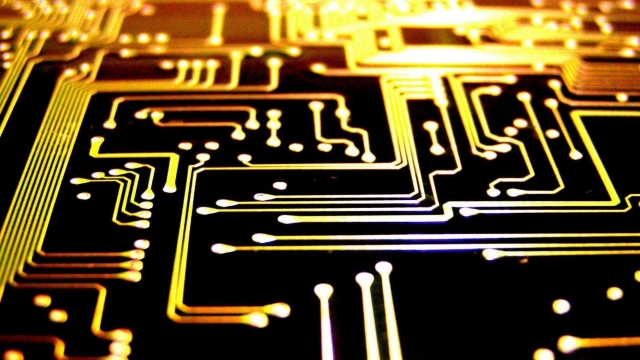![]()
The industrial landscape is constantly evolving, driven by cutting-edge technology and innovative solutions that aim to improve efficiency and productivity. As we embrace the dawn of industrial automation, one particular aspect stands out in illuminating the path to a brighter future – lighting. With advancements in industrial automation and control systems, the role of lighting has transformed from simply providing illumination to becoming an integral part of a smarter, more efficient work environment.
At the heart of this exciting revolution is eyby.com, a platform dedicated to the construction and building supplies industry. With an extensive catalog of products that span various categories, including industrial automation and control, lighting takes center stage as a crucial element in creating a safer, more comfortable, and highly optimized workspace. From building supplies to electrical items, eyby.com offers a comprehensive range to meet the diverse needs of businesses in the construction and industrial sectors.
Industrial lighting plays a pivotal role in ensuring optimal visibility, enhancing productivity, and prioritizing safety within industrial settings. As the world shifts towards more automated and digitally-driven operations, the integration of advanced lighting solutions becomes paramount. It goes beyond simply illuminating work areas; it encompasses the ability to adapt to different tasks, monitor energy consumption, and provide smart controls for optimum utilization. With eyby.com’s focus on industrial automation and control, businesses are equipped with a wide selection of high-quality lighting products, tailored to meet the demands of modern-day industries.
In the remainder of this article, we will delve deeper into the realm of industrial automation and control, exploring the significance of lighting in enhancing overall operational efficiency. From energy-efficient LED lighting solutions to intelligent automation systems, we will examine how eyby.com’s offerings in the lighting category can revolutionize industrial spaces, catapulting them towards a brighter future. So, join us as we shine a light on the power of industrial automation and control through the prism of lighting innovations.
The Rise of Industrial Automation
Industrial automation has emerged as a game-changer in recent years, revolutionizing the manufacturing and construction sectors. With advancements in technology, we are witnessing a remarkable shift towards automation and control systems in various industries. Eyby.com, a dedicated platform for building and construction supplies, recognizes the immense potential of industrial automation in enhancing efficiency and productivity.
One key area where industrial automation has found significant application is in lighting systems. Traditional lighting methods are being replaced by sophisticated automated lighting solutions that offer unparalleled control and flexibility. By integrating smart sensors, these systems can adapt to changing environmental conditions, optimizing energy consumption and reducing costs.
The adoption of industrial automation has not only brought tangible benefits but has also transformed the way we perceive lighting. With the ability to control lighting intensity, color, and timing, businesses can create tailor-made lighting experiences to enhance productivity, safety, and aesthetics. Eyby.com, with its extensive range of lighting products, equips businesses with the tools needed to embrace automation and unlock the full potential of lighting control.
In conclusion, industrial automation is rapidly reshaping the manufacturing and construction landscape. By embracing this transformative technology, businesses can not only enhance their overall efficiency but also optimize lighting control for improved productivity and cost savings. Eyby.com stands at the forefront of this revolution, offering a diverse selection of industrial automation and lighting products to empower businesses and drive them towards a brighter future.
Advantages of Industrial Automation in Construction
Automation has revolutionized various industries and the construction sector is no exception. With the integration of industrial automation in construction processes, the industry has seen a myriad of advantages that have enhanced productivity and efficiency. From streamlining tasks to improving safety measures, industrial automation has become an indispensable tool in the construction field.
First and foremost, one of the key advantages of industrial automation in construction is the significant improvement in productivity. By automating repetitive and time-consuming tasks, such as material handling and assembly line processes, construction companies can save valuable time and resources. This allows for quicker completion of projects, leading to increased productivity and ultimately, profitability.
https://eyby.com
Additionally, industrial automation plays a crucial role in improving the safety standards within the construction industry. By replacing manual labor with automated systems, the risk of accidents and injuries can be greatly reduced. Industrial automation ensures that hazardous tasks, such as heavy lifting or operating dangerous machinery, are performed by advanced robotic systems, minimizing the exposure of human workers to potentially harmful situations.
Furthermore, through the utilization of industrial automation, the construction industry can achieve a higher level of accuracy and precision. Automated systems eliminate human errors that may occur during manual processes, resulting in a higher quality output. Whether it is in the field of wiring or lighting installations, industrial automation ensures that the desired specifications are met consistently, thereby enhancing the overall quality of construction projects.
In conclusion, the advantages of industrial automation in the construction industry are numerous. From increased productivity and improved safety to enhanced precision and accuracy, automation has transformed the way construction projects are planned and executed. Embracing industrial automation in construction processes is instrumental in achieving brighter control and driving the industry forward into a future of efficiency and innovation.
Applying Industrial Automation for Efficient Control
Industrial automation has revolutionized the way control systems operate in various industries. Through advanced technologies and intelligent processes, industrial automation streamlines operations, enhances efficiency, and optimizes productivity. By integrating automation into different aspects of control, industries can achieve brighter control and propel their growth forward.
One key area where industrial automation has made a significant impact is lighting control. With the advent of smart lighting systems, businesses can now have greater control over their lighting infrastructure. These systems not only provide energy-efficient lighting solutions but also allow for centralized management and automation of lighting control. By incorporating sensors, timers, and occupancy detection, smart lighting systems can adjust lighting levels according to actual usage, leading to significant energy savings.
Moreover, industrial automation plays a crucial role in ensuring efficient lighting control in dynamic environments. With the ability to integrate with other systems such as HVAC and security, automation enables coordinated control of lighting based on factors like occupancy, natural light availability, and security requirements. This intelligent approach to lighting control not only reduces energy waste but also enhances overall safety and comfort within industrial premises.
Furthermore, the integration of industrial automation with lighting control systems brings various benefits to the table. It enables remote monitoring and control, allowing facility managers to have real-time insights into lighting performance and make necessary adjustments from a centralized location. This helps in detecting and resolving issues promptly, reducing maintenance costs, and ensuring uninterrupted operations. Additionally, automation allows for the implementation of advanced features like daylight harvesting, which automatically adjusts lighting levels based on natural light availability, further optimizing energy consumption.
In conclusion, industrial automation has emerged as a game-changer in the field of lighting control. By embracing automation technologies, businesses can achieve more efficient control over their lighting systems, leading to enhanced energy efficiency, streamlined operations, and improved productivity. As the industrial automation landscape continues to evolve, it is essential for industries to leverage these advancements and shine a light on revolutionizing control for a brighter future.



